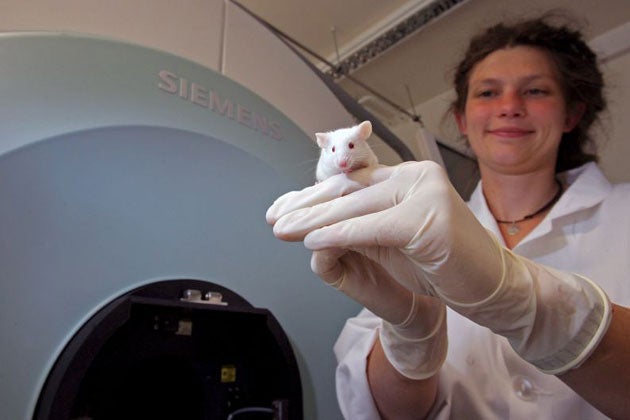40 per cent increase in animal experiments over past decade

Your support helps us to tell the story
From reproductive rights to climate change to Big Tech, The Independent is on the ground when the story is developing. Whether it's investigating the financials of Elon Musk's pro-Trump PAC or producing our latest documentary, 'The A Word', which shines a light on the American women fighting for reproductive rights, we know how important it is to parse out the facts from the messaging.
At such a critical moment in US history, we need reporters on the ground. Your donation allows us to keep sending journalists to speak to both sides of the story.
The Independent is trusted by Americans across the entire political spectrum. And unlike many other quality news outlets, we choose not to lock Americans out of our reporting and analysis with paywalls. We believe quality journalism should be available to everyone, paid for by those who can afford it.
Your support makes all the difference.Animal welfare charities reacted angrily to news today that the number of animal experiments rose to a record high in Britain last year.
Home Office figures showed that the number of procedures spiked by 2 per cent to 3.7 million, 40 per cent higher than a decade ago.
Procedures on pigs rose by 37 and on cats by 26 per cent but there were falls of 16 per cent for guinea pigs and 47 per cent for primates, showed the annual report of the Animals in Science Regulation Unit.
Increased numbers of laboratories broke testing rules, which included serious cases such as the accidental death by drowning of 208 mice and the killing of 194 rats by a faulty roof.
However only one of the 39 “infringements” – up six on 2010 - was deemed serious enough for prosecution,
Scientists defended the use of experiments and said researchers were reducing the proportion of animals used per study at a time of rising funding for bio-sciences.
The breeding of genetically modified animals and harmful mutants, mainly mice, accounted for 1.6 million procedures last year. Excluding those the rise in animal tests was even higher, up 3 per cent to 2.1 million.
The overall rise – compared with 2.7 million procedures in 2000 - suggested that the Coalition will struggle to meet its objective of last May to “work to reduce the use of animals in scientific research."
A head of the Government-funded body set up to develop alternatives said that only more investment would lead to a "major shift" in levels of animal testing. Dr Mark Prescott, head of research management at NC3Rs, which has an annual budget of £5.5 million, said demand for animals was outstripping the pace of progress.
"Speaking personally as someone who is passionate about animal welfare, any increase in the number of animals used is a cause for concern,” he said.
"I think we have a very sensible and efficient strategy for reducing animal use and reducing suffering. We could do very much more if we had a larger budget.”
Stephen Whitehead, Chief Executive of the Association of the British Pharmaceutical Industry, urged the public to understand the importance of scientific work involving animals. “Where medical research is concerned, we have a straightforward option – continue with medical research, and continue to save and improve lives; or stop medical research, and stop our quest to cure Alzheimer’s, HIV, cancer, and every single disease that is currently untreatable,” he said.
“For me personally the decision is obvious – we have to prioritise human life at the same time as continuing to strive to reduce the number of animals used in research.”
Troy Seidle, director of research and toxicology for Humane Society International, accused industry and government of failing to adopt enough humane alternatives to animal testing. “Yet another increase in the number of animals suffering in British laboratories is deeply depressing news for science, medical progress and animal welfare,” he said.
“Innovative and human-relevant research advances are taking place amidst an astonishingly impressive biotechnology revolution and yet we continue to paralyse rats, poison dogs and brain damage monkeys in the millions. What luddites these statistics make of Britain.”
Join our commenting forum
Join thought-provoking conversations, follow other Independent readers and see their replies
Comments